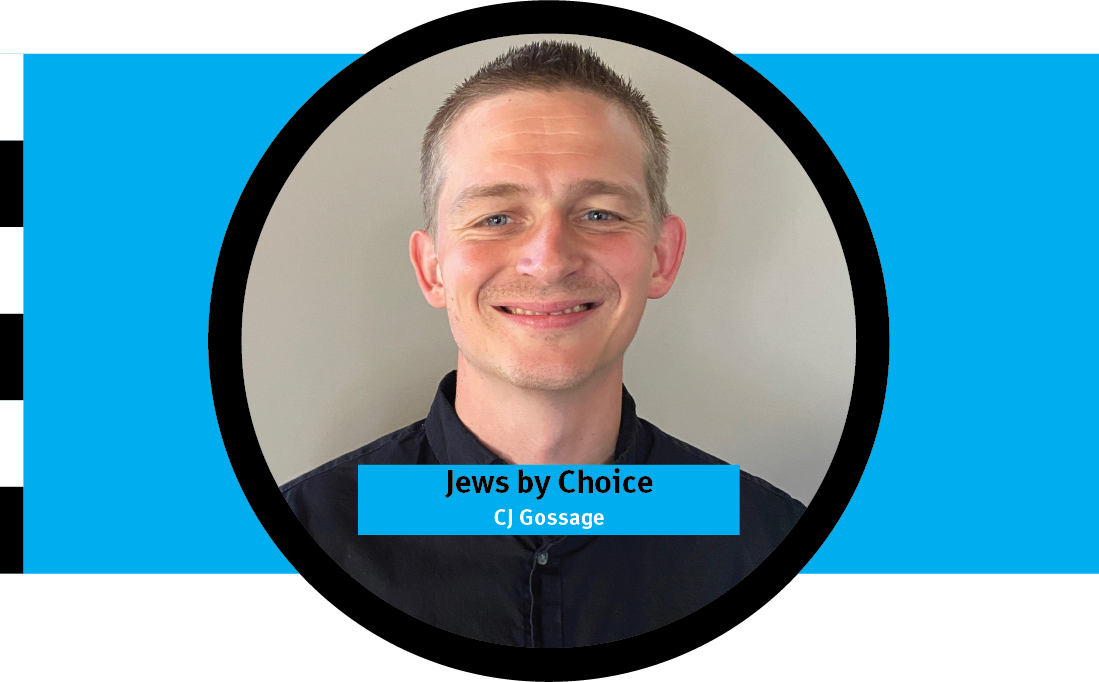
Christine Chait is an Ohio native. She was born in what she calls the “little big town” of Lebanon— a “great place to grow up.” She comes from a long line of Catholics, and her family took religion seriously. “We never missed a Sunday Mass. Catholic was who my family was.” She was “baptized and confirmed” but Catholicism never “really resonated with me.”
In high school, Christine was first exposed to Judaism in AP European History while learning about world religions. Always drawn to Catholicism’s “ancient ties,” Judaism too was ancient. After exploring Judaism, Christine thought, “this sounds like all the parts I like about Catholicism without all the parts I don’t believe in.”
After becoming excited about Judaism, she approached her parents about the prospects of learning more. “I am learning about Judaism at school, and I am very into it. Can I meet with a Rabbi?” With some levity, Christine recalls tacking on something like, “Oh, and I don’t know if I want to be Catholic anymore.” Christine summarizes her parents’ response: “No. We are Catholic. Your husband will be Catholic and so will your future children.” Coming from a very conservative background, where her parents’ word is final, Christine complied.
In the early 2010s, while away at university, Christine took part in a musical theater production where “seventy-five percent of the cast was Jewish.” One day “we were all talking about religion and I mentioned, ‘Oh I am Catholic, but I don’t believe in Jesus.’” Her Jewish castmates were curious about her comment and welcomed the religious conversation. This interaction invigorated her investigative spirit. “I began reading, reading, and reading—narratives, biographies, all sorts of things about Jewish culture.” Her curiosity and passion for Judaism steadily grew during her time at university and after.
In 2018–2019, Christine finally decided to make some major life decisions. “This was the year where I accomplish my goals.” Christine wanted to “meet her future spouse, convert to Judaism, and get the job of my dreams.” From what I gather, she accomplished these goals in that order.
Christine only sought out Jewish men online because “I was already planning on converting. I wanted a Jewish spouse and a Jewish family.” Soon she met Ryan, and they began dating. After they began getting serious, Ryan told me, “I like you and am interested, but I want to marry a Jewish woman,” implying their relationship might not work out after all. Christine lightheartedly declares, “I was seeking him out because he was Jewish!”
Soon Christine was asking members of Cincinnati’s Jewish community which rabbis and synagogues would best facilitate her conversion. After receiving two recommendations for Rabbi Michael Danziger of Wise, they “met at Starbucks and clicked instantly.” This meeting began a year-long process, which was unique in many ways. First, Christine notes how “not attending formal conversion classes” is itself rare. Thoughtfully she states, “I treated my conversion like an independent study.” Her and Danziger would “meet once a month, and I’d arrive with six pages of notes that we’d discuss.” The intellectual openness that first attracted her to Judaism was only strengthened during these meetings with Rabbi Danziger. Upon mentioning to him that she was wrestling with the idea of an afterlife, he responded, “Great! Let’s talk about it!” Such openness and intellectual humility created a sharp contrast with Christine’s Catholic upbringing where she felt questions were not exactly welcome. Second, her conversion was unique because COVID forced her Beit Din to meet on Zoom. Third, even after converting, she had to wait for the Mikveh to reopen in accordance with COVID protocols. It would be Rabbi Karen Thomashow who conducted her Mikveh. Both the conversion and the Mikveh were “beautiful,” recalls Christine.
Ever since she first considered converting, Christine’s life and newfound Judaism have been steadily merging. Before converting she had dropped out of graduate school and began working at the Jewish Federation. After gaining valuable experience as an admin for two years, she found her niche at Ish, a local organization centered around Jewish arts, culture, and community. “I have had the time of my life here.” Christine is the Development and Events Manager for Ish. These two jobs came at the perfect time, allowing Christine to “explore what Judaism means to me” first as a potential convert and now as a member of the Jewish community.
Presently, Christine teaches Kehillah at Wise Temple. This has been an “incredible chance to both learn and teach.” While she does not keep Shabbat in the traditional sense, she certainly does not work. “I honor Shabbat and welcome it” by lighting candles, making challah on occasion, and carving out time with the people she loves. Christine delights in “having a designated moment each week to be completely present.”
Similarly, Christine does not follow the traditional tenets of Kashrut, but refrains from eating pork and shellfish. In addition, she considers her humane eating practices—“eighty percent plant-based”—to be an extension of Kashrut. “I take what I feel are the essences of Kashrut and implement them into my eating practices.”
However, she does keep Kashrut for Passover, one of her favorite holidays. Unable to choose a particular favorite (she likes various holidays for various reasons), Passover is her favorite “family holiday.” She enjoys “clearing our house” for Passover and enjoying our family seder “with over forty people!” Yom Kippur remains her favorite “religious holiday.” She takes the fast very serious and enjoys being at shul for the entire day. “Of course, Hannukah is great too!” she sneaks in.
Christine is grateful for the “radiating joy of Judaism.” Despite “constant oppression” throughout human history “we are such a joyful people, and we can find the joy in everything. To me, that is incredible!” From where I sit, Christine Chait exemplifies that very joy she so clearly celebrates.


